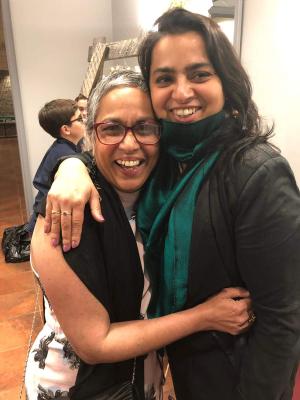We know awareness of ovarian cancer remains too low with just one in five women aware that bloating is a key symptom. Knowing the symptoms is vital to early diagnosis of the disease and stopping one in seven women dying within two months of diagnosis
Overlooked: a podcast about ovarian cancer tells the story of Golda’s mother, Teresa. The podcast aims to raise awareness of ovarian cancer through Teresa’s audio diaries, and from experts working in the field. Upon hearing the unique work we do to engage healthcare professionals, Golda was keen to hear more.
If women aren't aware of the symptoms, they aren't aware of the seriousness of the symptoms and potentially what they could be. As a result, they won't go to the doctor.
Dr Sharon Tate, Head of Primary Care, at Target Ovarian Cancer highlighted the crucial element of awareness of ovarian cancer symptoms among the general public and GPs and the general public, and the need for investment in specific ovarian cancer education during their training.
This need is highlighted by our latest research which concerningly found 46% of GPs believe that ovarian cancer presents in the late stages. This misconception, combined with a lack of knowledge and education on ovarian cancer can lead to detrimental consequences for women.
A GP plays such an important role in recognising these symptoms and improving outcomes by having ovarian cancer diagnosed or ruled out.
However whilst highlighting this, Sharon drew on the realities GPs are facing and how that can often be a barrier to diagnosis. From our Pathfinder research and Breaking Down Barriers to Early Diagnosis project, GPs have told us some of the challenges they face. Symptoms of ovarian cancer can be non-specific and indicate other illnesses, hence why it can sometimes be misdiagnosed as IBS or perimenopause. Moreover, they tell us that throughout their career, a GP will rarely see a case of ovarian cancer.
It's the GPs job to basically solve that puzzle, to try and find the most appropriate route to go down. It's really challenging, but what we do know is that GPs do not want to miss a diagnosis of ovarian cancer. And when that does happen, when a patient has a bad experience, it’s really devastating for that healthcare professional, and often what it does is it leaves them with quite a mark.
Not only is it devastating for the healthcare professional, it's devastating for the patient. Recognising these challenges and the impact they have on individual lives, Target Ovarian Cancer has prioritised GP engagement – which involves providing access to free educational modules, speaking at conferences, developing and implementing safety netting tools to assist with diagnosis, and understanding what the barriers are and how we can overcome them, together.
To read the full interview, visit Overlooked Pod.

About Overlooked: a podcast about ovarian cancer
Seeing a new podcast launch aiming to get more people talking about ovarian cancer is a positive step towards normalising conversations. We caught up with Golda after her interview with Sharon to find out more about her reasons for producing this podcast.
“Here’s what I know about ovarian cancer: it often arrives quietly, and is discovered too late. I know the survival rate is abysmal, and that it’s the deadliest gynaecological cancer that exists. I know that it’s often passed down from one generation to another. And I know it doesn’t give up easily.
“I know this because my mom has survived ovarian cancer four times in the last five years. Her name is Teresa Arthur, and when she was first diagnosed with stage 4 cancer in 2018, it was a devastating diagnosis for our family.
“At the time, I asked her to start recording everything on her phone, audio diary-style. Maybe we’ll do something with it one day, mum, I told her. Back then I was looking for some way to understand this disease and only came across the most depressing of statistics, or dense scientific information that was hard to parse. There was nothing I could wrap both my head and my heart around. So, why not make a podcast? After all, this was my profession.
“I’ve been an audio producer, reporter and editor for the last 25 years, working for the CBC in Canada, the BBC in London, and public radio and podcasting here in New York. It did take me a full five years to eventually make this podcast, and has been by far the toughest project I’ve worked on professionally.
“But I wanted to make something that gave people like me a way to understand the science behind this cancer, but also the intensely emotional, deeply human story underpinning survivorship. My goal was to educate listeners about the nature and treatment of ovarian cancer - this is what you might call informational support. But the show seeks to provide a form of emotional support as well - encouragement and inspiration, room for optimism, a way to process difficult moments - through storytelling.
“In these five years I also discovered that I have the same genetic mutation my mom does, and figuring out what to do next is all captured in the series as it unfolds.
The story of ovarian cancer too has moved in these last five years: new awareness, drugs and strides in genetics technology and research have given fresh hope to understanding and dealing with this disease that has for too long been left in the dark.
Find out more about what we’re doing in the UK to engage GPs in our work and improve early diagnosis of ovarian cancer.



